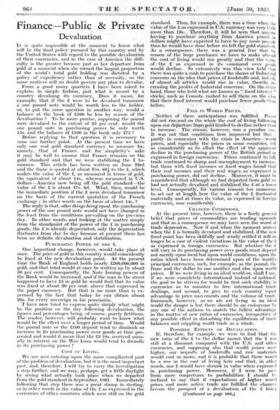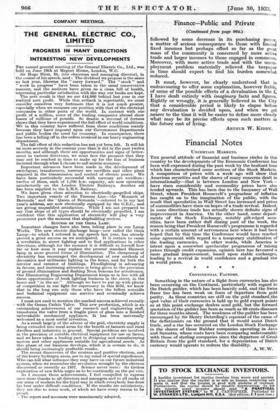Finance—Public & Private
Devaluation
IT is quite impossible at the moment ti? _know *hat will be the final policy- pursued- by this country and by the United States with regard to the possible devaluation of their currencies, and in the case of America The diffi- culty is the greater because just as her departure from gold at a moment when she owned the largest of the world's total gold holding was dictated by a policy of expediency rather than of necessity, so the same motives will no doubt govern any plan to devalue. From a good many quarters I have been asked to explain, in simple fashion, just what is meant by a country devaluing its currency.- Does it mean, ' for example, that if the I were to be devalued tomorrow a one pound note would be worth less to the holder, or, to put the same question in another way; Would.a balance at the bank of 1100 be less by reason of the devaluation ? To be more precise, supposing the pound were devalued to the extent of 25 per cent. would the one pound note in purchasing power be only worth 15s. and the balance of 1100 in the bank only £75? Before replying to that question' it is necessary tO raise one further point. At the -present time we have only one real gold standard currency to' measure by, namely, that of France, and for simplicity's sake it may be well to assume that France remains on the gold standard and that we were stabilizing the E to- morrow. This article has been written on June 23rd and the franc is quoted at about Frs. 86f to the 1, which makes the value of the E, as measured in terms of gold, the equivalent of about 14s., whereas measured in U.S. dollars—America now being off the gold standard—the value of the 1 is about 17s. 6d. What, then, would be the immediate position if the £ were devalued tomorrow on the 'basis of the current quotation of The French exchange ; in other words on the basis of about 14s.?
The reply is that; -other things being equal, thepurchasing - power of the one pound note would not have changed in the least from the conditions prevailing on the previous 'day. In other words, and looking at the matter simply from the standpoint of The power of the 1 in purchasmg kz;OCia, the / is already depreciated, only the depreciation fluctuates from day to day because at present there has been no definite devaluation and stabilization.
PURCHASING POWER OF THE X.
One important change, however, would take place at Once; The price of gold in this country would coincidently be flied at the new devaluation point. At the present time the -Bank of England holds nearly 1200,000,000 in gold, and that total would at once be written up by about 30 per cent. Consequently, the Note Issuing powers of the Bank would be increased, and if the man in the street happened to have 15 in gold he would find that its value was _fixed at about 30 per cent, above that expressed in the paper currency. But that is no more than is ex- pressed by the fact that today he can obtain about 20s. for every 'sovereign in his Possession. have now tried to express quite ibifPly:What might be the position on the day following devaluation, the figures and percentages being, of course, purely fictitious. The reader, however, will probably want to know what would be the effect over a longer-period of time. Would the pound note or the £100 deposit tend to diminish or increase in its purchasing power over goods as time pro- cethed and would it mean that the 1.8 10s. received annu- ally in interest on the War Loan would tend to dwindle in its purchasing-power ? •
COST OF LIVING.
We are now entering upon the more complicated part of the problem of devaluation, but it is the most important part, and, therefore, I will try to carry the investigation a step further, and we may, perhaps, get a little daylight by seeing what actually took place when we departed from the gold standard in September, 1981. Immediately following that step there- was a great slump in sterling, or in other words in the value of the 1 as expressed in the currencies of other countries which were still on the gold standard. Thus, for example, there was a time when the value of the 1 as expressed in U.S. currency was very little more than 13s. Therefore, it will be seen that anyone hiving to purchase anything from" America priced in dollars might have expected to have to pay more pounds than he would have done. before we left the gold standard, As a consequence, there was a general fear that by reason of the large purchases we have to Make abroad the cost of living would rise greatly. and that .the value of... the £ as expressed in its command over goods would decline. So extensively was this view held that there was quite a rush to purchase the shares of Industrial Concerns on the idea that prices of foodstuffs and, indeed, of almost all articles would rise in value, thereby in. creasing the profits of Industrial concerns.- On the other hand, those who held what are known as 1` fixed interest" stocks, such as Consols, rushed to sell them on the ides that their fixed interest would purchase fewer goods than before. .
FALL IN WORLD PRICES. ."
Neither of these anticipations was fulfilled. Prices did not' riseland on the whole the cost 'of living. following _upon our dejiarture from gold tended to decline rather than to increase. The reason, however, Was a peculiar one. It was not; that conditions here improved but that- - partly in connexion with the 'crisis in America—world prices, and' especially the prices in 'some countries, fell so considerably as to offset the effect of the apparent decline in the purchasing power of the British pound as expressed in foreign currencies. Prices continued to fall, trade continued to slump and unemployment to increase, but those- with fixed 'incomes or fixed wages found that their real incomes' and their real wages, as expressed in purchasing power, did not decline. Moreover, it must be remembered that although we had departed from gold we had not actually. devalued and stabilized the 1 at a lower level. , Consequently, for various reason a too, numerous to set 'out at length Jtere the' value of the £ .fluctuated materially and at times its, yalue, as expressed in foreign currencies, rose Considerably. - -
CHANGED CONDITIONS.
At the present time, however, there is a fairly general belief that prices of commodities are tending upwards and that as a consequence we may have seen the worst of trade depres-Sion. Now if and when the -moment 'arrives when the £ is formally.devalued and stabilized, if the new fixed point has been skilfully and wisely settled it will no longer be a case of violent Variation's in the value of the I as expressed in foreign currencies. But whether the i Will vary in RS purchasing power over goods must depend not merely upon local.but Upon world conditions, upon the ratios 'which have been determined upon of the world's principal currencies, such, for example, as the pound, the franc and the dollar to one another and also upon world prices. If we were living in an ideal world or, shall I say, if we were Completely international Instead of national, the goal to be striven for would be first such stability in currencies as to minister to free international trade dealings, and second, to give to each country equal advantage in price movements and the volume of trade. Inasmuch, however, as we are not living in an ideal world the danger is lest there should be an endeavour by any one of the nations to, snatch the _fullest advantage in the -matter of new ratios of currencies, irrespective of any possible effect in disturbing the equilibrium of trade balances and crippling world trade as a whole.
'POSSIELE EFFECTS OF DEVALUATION.
If, therefore, for example, -we were to find that the new ratio of the £ to the dollar meant that the £ was still at a discount compared with the 'U.S. and other currencies, and supposing also that world prices were higher; our imports of foodstuffs and raw materials would cost us more, and it is probable that there would be a rise in the cost of living here and- that, in other words, our -would have shrunk in value when expressed in purchasing power. Moreover, if I were to pass from mere conjectures to probabilities I should be inclined to say that if- expectations of higher world prices and more active trade are fulfilled the chances favour the prospect of a devaluation of the t being (Continued on page 966.)
Finance—Public and Private ,
(Continued from page 964.)
followed by some decrease in its purchasing power, a matter of serious consequence to those with limited fixed incomes but perhaps offset so far as the great mass of the community is concerned by more active trade and larger incomes to those engaged in commerce. Moreover, with more active trade and with the unem. ployment problem materially relieved the taxpayer in time should expect to find his burden somewhat reduced.
It must, however, be clearly understood that ia endeavouring to offer some explanation, however feeble, of some of the possible effects of a devaluation in the f, I have dealt entirely with imaginary facts and figures. Rightly or wrongly, it is generally believed in the City that a considerable period is likely to elapse before any devaluation is decided upon, and when we get nearer to the time it will be easier to define more clearly what may be its precise effects upon such matters as the future cost of living. ARTHUR. W. KIDDY.











































 Previous page
Previous page